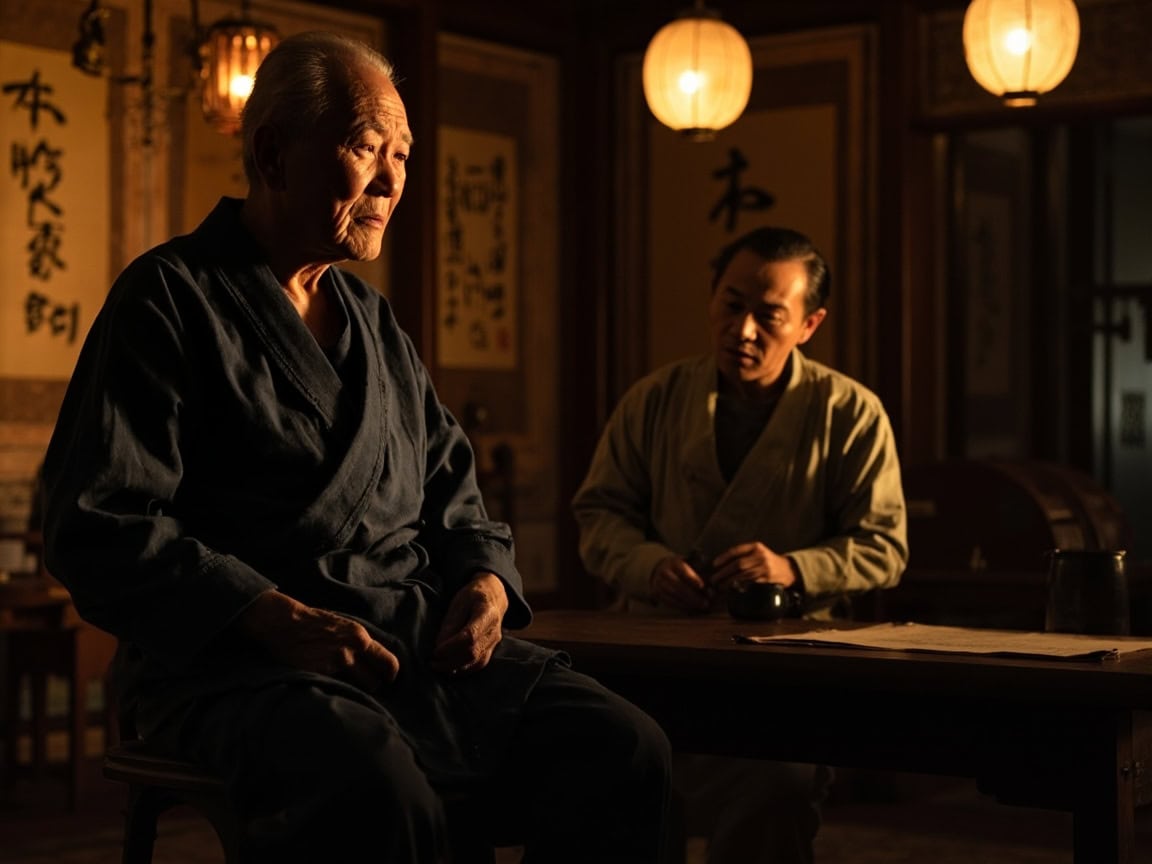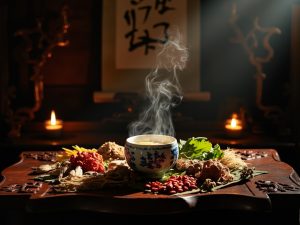Table of Contents
ToggleTraditional Chinese Medicine Case Analysis 4: Abdominal distension, chest tightness
Author: Gu Yuxi Editor: Gu Yuxi Translator: Gu Yuxi
Traditional Chinese Medicine Case Study from Chen Xuezhong’s [Lizhong Tang for Treating Abdominal Distension] in “Luo Jiao Annotation of Guilin Ancient Edition of Shanghan Zabing Lun”
Original Text:
Liu, male, 71 years old, first consulted on May 25, 2017. The patient sought treatment for “nighttime abdominal distension for one week.” For one week, without obvious triggers, the patient experienced abdominal distension in the middle of the night (3:00-5:00 AM), waking him from deep sleep. The distension gradually subsided around 5:00 AM, allowing him to sleep, accompanied by chest tightness. There was no abdominal distension during the day. Bowel movements occurred once a day, with normal consistency. Occasionally, there was acid regurgitation. His tongue body was swollen with teeth marks on the edges, a pale red tongue proper, and a white, greasy coating. The pulse was thin, weak, and powerless.
Diagnosis: Taiyin disease; Differentiation: Taiyin deficiency-cold; Treatment Principle: Benefit Qi and warm the Middle Jiao; Formula: Lizhong Tang. Medication: Dried Ginger 30g, Codonopsis pilosula 30g, Atractylodes macrocephala 30g, Prepared Licorice 15g. Four doses, decocted in water, one dose per day. Follow-up on May 31: the patient reported that the distension disappeared after one dose, no acid regurgitation, and he completed all four doses. Currently, there is no abdominal discomfort, and sleep is good.
【Traditional Chinese Medicine Syndrome Differentiation Approach】:
Differentiating Six Diseases:
- Difficulty with urination : None.
- Taiyang Disease : None.
- Yangming Disease : None.
- Shaoyang Disease : None.
- Shaoyin Disease : None.
- Taiyin Disease : Present. Abdominal distension for one week at night, experienced abdominal distension in the middle of the night (3:00-5:00 AM), waking him from deep sleep, and the distension gradually subsided around 5:00 AM, allowing him to sleep, accompanied by chest tightness. Bowel movements once a day, normal consistency, occasional acid regurgitation. Tongue body swollen with teeth marks on the edges, pale red tongue proper, and a white, greasy coating. Pulse thin, weak, and powerless.
- Jueyin Disease : None.
Differentiating Miscellaneous Diseases:
- Qi Deficiency : None.
- Blood Deficiency : None.
- Water-Dampness : None.
- Food Stagnation : None. Bowel movements once a day.
- Phlegm Obstruction : None.
- Blood Stasis : None.
- Other Miscellaneous Diseases: None.
Summary:
From the differentiation, it can be confirmed that the patient has no Yang symptoms, as there are no symptoms indicating excessive reaction. If it’s not Yang, it’s Yin, and the remaining must be one of the three Yin diseases. The key symptoms of Shaoyin disease—[11.1] “Shaoyin disease: pulse is faint and thin, but only desires sleep.”—are also absent; the patient’s mental and physical state is still good. According to Hu Xishu’s classification method, there are no Yin-type exterior syndromes either.
The key symptoms of Jueyin disease—[11.47] “Jueyin disease: xiaoke (wasting and thirsting), qi rushing up to strike the heart, heart pain and heat, hunger but no desire to eat, eating causes vomiting of roundworms, after purging, diarrhea won’t stop.”—are even more irrelevant. Even using the exclusion method up to this point, one can conclude that it’s probably Taiyin disease. Even if it’s not a very standard Taiyin disease, the treatment method should be quite similar.
The key symptoms of Taiyin disease—[10.12] “Taiyin disease: abdominal fullness and vomiting, inability to eat, spontaneous diarrhea becomes worse, occasional spontaneous abdominal pain, if purged, there will certainly be chest-below hardness.”—This clause shares one symptom with the case study: abdominal fullness/distension. The patient does not have diarrhea symptoms, but there is an occasional symptom of acid regurgitation, which is a manifestation of indigestion.
Actually, in the Guilin Ancient Edition of Shanghan Zabing Lun, there is a clause that aligns more closely with this case study—[5.50] “Cold disease: abdominal fullness with borborygmus, undigested food, sanxie (diarrhea with undigested food), severe cases lead to flaccidity and inability to retract the legs, pulse slow and wiry; this is cold evil invading the Spleen, Lizhong Tang is indicated; if it becomes stuck, then there is severe pain and inability to flex and extend at the hip joint, Zhishi Baizhu Fuling Gancao Tang is indicated.”
Shanghan Zabing Lun Clause Corresponding to This
Traditional Chinese Medicine
Case:
Cold Disease Pulse Patterns and Treatment, Chapter 12, 5.50—[5.50] “Cold disease: abdominal fullness with borborygmus, undigested food, sanxie (diarrhea with undigested food), severe cases lead to flaccidity and inability to retract the legs, pulse slow and wiry; this is cold evil invading the Spleen, Lizhong Tang is indicated; if it becomes stuck, then there is severe pain and inability to flex and extend at the hip joint, Zhishi Baizhu Fuling Gancao Tang is indicated.”
Abdominal fullness here means abdominal distension. Undigested food means indigestion, food not being digested after eating. Sanxie refers to watery diarrhea with undigested food residue expelled—corresponding to the occasional acid regurgitation mentioned above.
The series of symptoms of “cold disease” mentioned in this clause, affecting this location, falls under cold evil invading the Spleen. This is within the scope of Zang-Fu differentiation. Its corresponding treatment method is actually very similar to that of Taiyin disease.
The basis is: [10.15] “Spontaneous diarrhea without thirst belongs to Taiyin, because there is cold in its Zang organ, it should be warmed, and Lizhong or Sini formulations are suitable.” Here, “spontaneous diarrhea without thirst” can be temporarily disregarded; it’s just one set of symptoms of Taiyin disease. The latter part, “because there is cold in its Zang organ, it should be warmed,” is also linked to “belongs to Taiyin.” As long as it can be proven that the patient belongs to Taiyin with cold in the Zang organ, classical formulas like Lizhong or Sini can be used to warm it.
Hu Xishu’s Interpretation of This Clause:
This clause is not present in the Song edition, so there is no related interpretation.
Formula: Lizhong Tang
Source: Shanghan Zabing Lun
Composition: Ginseng 3 liang Dried Ginger 3 liang Atractylodes macrocephala 3 liang Licorice 3 liang (prepared) The above four ingredients, use eight sheng of water, decoct to get three sheng, remove dregs, take one sheng warm, three times a day.
Hu Xishu’s Dosage:
Ginseng 9g, Dried Ginger 9g, Prepared Licorice 9g, Atractylodes macrocephala 9g.
Hu Xishu’s Formula-Pattern Correspondence:
Lizhong Tang originates from Gancao Ganjiang Tang (Licorice and Dried Ginger Decoction). Adding Ginseng and Atractylodes macrocephala to Licorice and Dried Ginger forms Lizhong Tang. Ginseng and Licorice are herbs that strengthen the stomach and regulate the Middle Jiao. Dried Ginger and Atractylodes macrocephala warm the Middle Jiao and dispel dampness, removing water. This is because of stomach deficiency with cold, so this formula is called “regulating the Middle.”
The main symptoms of Lizhong Tang syndrome are stomach deficiency with epigastric hardness and possibly vomiting or loose stools, caused by stomach weakness. For diarrhea with heat or unrelenting diarrhea, Lizhong Tang strengthens the stomach and treats the diarrhea.
If there is deficiency and excessive cold in the Middle Jiao (Middle Jiao deficiency means stomach deficiency), and cold-dampness retention in the stomach, or if upper Jiao deficiency can also cause this situation, then Lizhong Tang is also indicated.
Nausea and vomiting, epigastric hardness and firmness (which is epigastric hardness), are related to stomach deficiency. Nausea and vomiting indicate stomach deficiency with fluid retention, which is Lizhong Tang syndrome. Therefore, we say Lizhong Tang often treats vomiting. Atractylodes macrocephala dispels water and promotes diuresis; it’s a warm-natured herb. For water retention in the stomach, Atractylodes macrocephala is often used.
Lizhong Tang also treats spitting of clear frothy saliva, as spitting of clear frothy saliva also indicates stomach cold with fluid retention. Lizhong Tang contains Ginseng, indicating not only cold but also deficiency. So, spitting of clear frothy saliva accompanies epigastric hardness. However, the cold in Lizhong Tang syndrome does not affect the head.
Disclaimer:
The experiences and insights shared above represent the author’s personal usage and understanding, and are provided for reference only as part of academic exchange. Please do not blindly replicate or apply them; any consequences arising from such actions are solely your responsibility. As individual constitutions vary, medication should be tailored accordingly. It is advisable to use such treatments under the guidance of a qualified physician. If you have additional experiences to share, comments and submissions are welcome.
If you appreciate my article, please give it a like.
If you are a generous and affluent individual, please consider making a donation!
Your recognition is my greatest motivation to continue writing—thank you very much!
USD Donation Button —
A RMB donation button is available below.
 微信赞赏
微信赞赏 支付宝赞赏
支付宝赞赏




